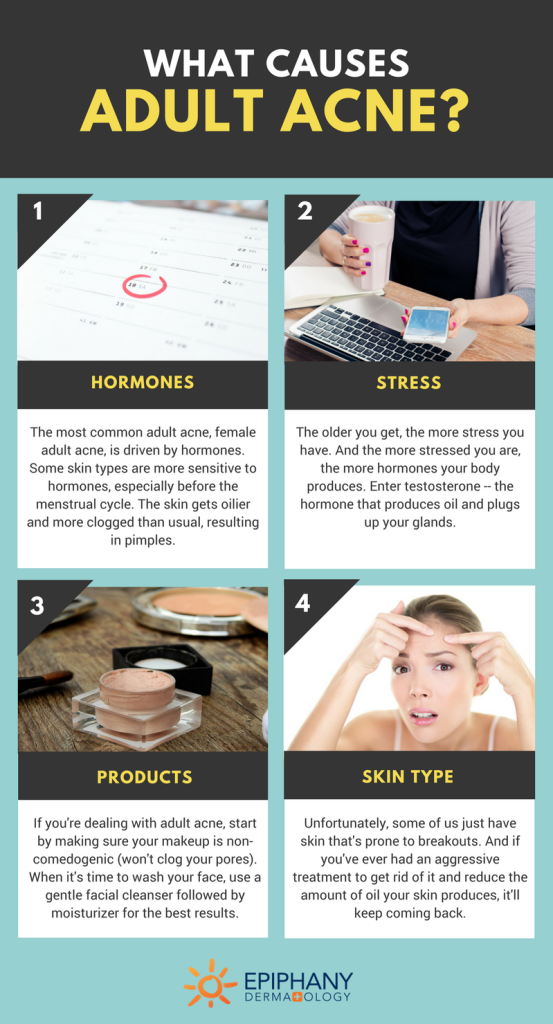

Adult acne suddenly appearing can be frustrating and concerning. This article delves into the surprising causes behind this skin condition and provides practical management tips to help you regain clear skin. Adult acne, characterized by pimples, blackheads, and cysts, can affect anyone at any age, disrupting self-esteem and daily life. This article will explain common causes, discuss effective treatment options, and offer practical advice to help you manage this frustrating skin concern. The structure of this article is as follows: we’ll start by explaining the potential causes and triggers. Next, we’ll delve into effective skincare routines and lifestyle adjustments. Finally, we’ll outline professional interventions and discuss available treatments.
Understanding the Root Causes of Adult Acne
Hormonal Imbalances
Hormonal fluctuations are a common trigger for acne in adults. Changes in estrogen and testosterone levels, especially during menopause, pregnancy, or with certain medications, can impact oil production, leading to increased sebum, which is a primary cause of acne. Some medications can also cause hormonal fluctuations that contribute to breakouts. Stress can also induce hormonal changes, exacerbating the problem.
Lifestyle Factors Contributing to Adult Acne
Stress
Stress is a significant contributor to various health issues, including acne. When stressed, the body releases hormones that stimulate oil production, increasing the risk of breakouts. Finding healthy stress management techniques, such as yoga, meditation, or spending time in nature, can help mitigate this issue. Diet can also influence the severity of acne. Sugary foods, processed foods, and high-fat foods often have a detrimental effect, so focusing on a balanced diet can reduce the risk of breakouts.
Related Post : Choosing the Right Acne Skincare Products? Avoiding Mistakes.
Dietary Choices
Certain foods may worsen acne. A high-glycemic index diet, rich in refined sugars and processed foods, can cause inflammation and contribute to breakouts. Focusing on a balanced diet that emphasizes fruits, vegetables, lean protein, and healthy fats can be beneficial.
Poor Skincare Habits
Insufficient cleansing, improper exfoliation, and neglecting the skin’s natural barrier can increase the likelihood of acne. Regular, gentle cleansing and using appropriate skincare products can help keep the skin balanced and prevent clogs.
The Role of Genetics and Underlying Medical Conditions
Genetic Predisposition
A family history of acne can increase the likelihood of developing the condition. Genes can play a role in oil production, skin sensitivity, and the way skin cells grow, which can contribute to breakouts. This genetic predisposition often needs further assessment by a dermatologist to determine proper treatments.
Effective Management Strategies for Adult Acne
Professional Guidance
Consulting a dermatologist is essential for a personalized treatment plan. They can diagnose the underlying cause of your acne, recommend appropriate treatments, and monitor your progress. A dermatologist can provide personalized advice based on your specific skin type and acne characteristics. They can also educate on the effectiveness and potential side effects of various treatments.
Skincare Routines and Lifestyle Adjustments
Cleansing and Moisturizing
Adopt a gentle cleansing routine with products suited for your skin type. Use a non-comedogenic moisturizer to prevent further clogging and irritation. Always apply makeup, sunscreen or other products carefully.
Topical Treatments and Other Recommendations
Choosing the Right Products
Several topical treatments are available to manage acne. These products may contain ingredients such as salicylic acid, benzoyl peroxide, or retinoids. Choose products that align with your skin’s specific needs and consult a dermatologist for recommendations.
Oral Medications for Adult Acne Treatment
Addressing Underlying Issues
In severe cases of adult acne, oral medications might be necessary. These can target hormonal imbalances or inflammation. These oral treatments should only be used under the direct supervision of a dermatologist.
In conclusion, understanding the sudden onset of adult acne requires a comprehensive approach. Identifying potential triggers, adopting healthy lifestyle habits, and consulting with a dermatologist are crucial steps in managing and resolving this skin concern. This article provided a detailed overview of the causes and management tips for sudden adult acne. If you’re experiencing this issue, consider the recommendations in this article and consult a dermatologist for personalized advice and treatment options. A healthy skincare routine and understanding the triggers are key to preventing future breakouts.